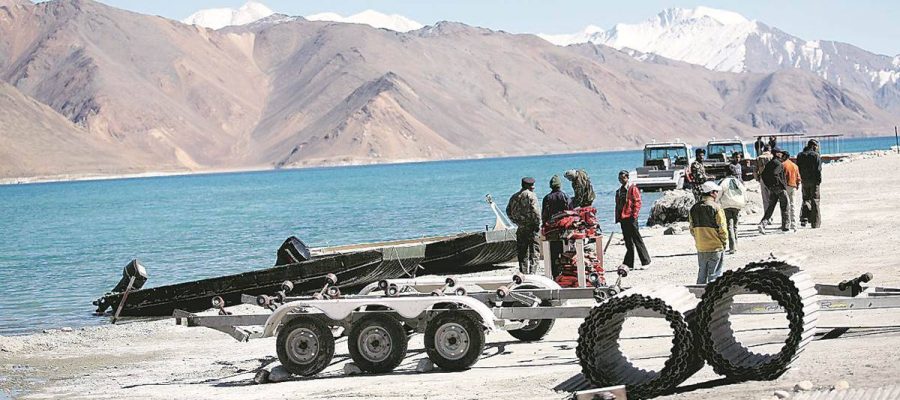While India said that the standoff was caused by China’s unilateral attempts to alter the status quo, China said that India should cherish the hard-won situation.
Any hopes of achieving a breakthrough for disengagement from Patrolling Points (PP) 15 in Hot Springs during the 13th round of Corps Commander level talks held on Sunday, remained unfulfilled. Both sides issued independent statements on Monday morning, blaming each other for the situation. While India said that the standoff was caused by China’s unilateral attempts to alter the status quo, China said that India should cherish the hard-won situation.
The Army said in a statement that during the Corps Commander level meeting was held at the Chushul-Moldo border meeting point on Sunday, “the discussions between the two sides focussed on resolution of the remaining issues” along the Line of Actual Control (LAC) in eastern Ladakh.
“The Indian side pointed out that the situation along the LAC had been caused by unilateral attempts of Chinese side to alter the status quo and in violation of the bilateral agreements. It was therefore necessary that the Chinese side take appropriate steps in the remaining areas so as to restore peace and tranquillity along the LAC in the Western Sector.”
The Army stated that this would also be in accord “with the guidance provided by the two Foreign Ministers in their recent meeting in Dushanbe where they had agreed that the two sides should resolve the remaining issues at the earliest”.
India, the Army said, “emphasised such resolution of the remaining areas would facilitate progress in the bilateral relations. During the meeting, the Indian side therefore made constructive suggestions for resolving the remaining areas but the Chinese side was not agreeable and also could not provide any forward-looking proposals.”
“The meeting thus did not result in resolution of the remaining areas,” the Army stated.
It mentioned though that both the sides “have agreed to maintain communications and also to maintain stability on the ground”.
“It is our expectation that the Chinese side will take into account the overall perspective of bilateral relations and will work towards early resolution of the remaining issues while fully abiding by bilateral agreements and protocols.”
Going into the talks Indian officials had been hopeful that both sides would agree to disengage from PP15, even as the issues in Depsang Plains and Demchok were yet to be resolved. In the past, when talks had been successful in coming to an agreement on other friction points, the two sides had issued a joint statement. Separate statements by the two sides after the latest round of talks show that differences are far from being resolved.
Senior Colonel Long Shaohua, spokesperson for the Western Theater Command of the People’s Liberation Army said in a statement, “instead of misjudging the situation, the Indian side should cherish the hard-won situation in China-India border areas.”
China’s Defence Ministry mentioned that during the meeting “the Chinese side made great efforts to promote the easing and cooling of the border situation and fully demonstrated China’s sincerity of maintaining overall interests of bilateral military relations,” but, “the Indian side still persisted in its unreasonable and unrealistic demands, which added difficulties to the negotiations”.
The statement said that Long “pointed out that China is firm in its resolve to safeguard national sovereignty. He hoped that the Indian side should avoid misjudging the situation and cherish the hard-won situation in the China-India border areas.”
“The Indian side should abide by the relevant agreements and consensus reached between the two countries and two militaries, show sincerity and take concrete actions to jointly safeguard peace and stability in the border areas with China, the spokesperson added.”
For India, the talks were led by Lt Gen PGK Menon, commander of the Leh-based XIV Corps, which is responsible for the Line of Actual Control in Ladakh, and Maj Gen Liu Lin, commander of the Xinjiang Military district, headed the Chinese delegation.
Going by the tone of the statements from both sides it is likely that troops from both sides will have to spend another winter in Ladakh’s harsh climate. While a small, platoon-sized unit of Chinese troops continue to be on the Indian side of the LAC at PP15, China is blocking India from accessing its five patrolling points in Depsang Plains in the north.
Depsang Plains is sensitive for India, as it is close to the Daulat Beg Oldie base, near the Karakoram Pass in the north. Further, in Demchok, some “so-called civilians” have pitched tents on the Indian side of the Charding Nala.
The countries have around 50,000 troops each in the reach, along with additional weapons, tanks, artillery guns, air defence assets that were brought in last year.
Speaking a day before the talks Army Chief General MM Naravane had said that China has been building infrastructure in the region, and was “here to stay”.
“It is a matter of concern, that the large-scale build-up, which had occurred, continued to be in place and to sustain that kind of build-up, there has been an equal amount of infrastructure development on the Chinese side.” He had stated, “It means that they’re there to stay,” Naravane stated. “But if they’re there to stay, we’re there to stay too. And the build-up on our side, and the developments on our side, is as good as what PLA has done.”
Source: Read Full Article


